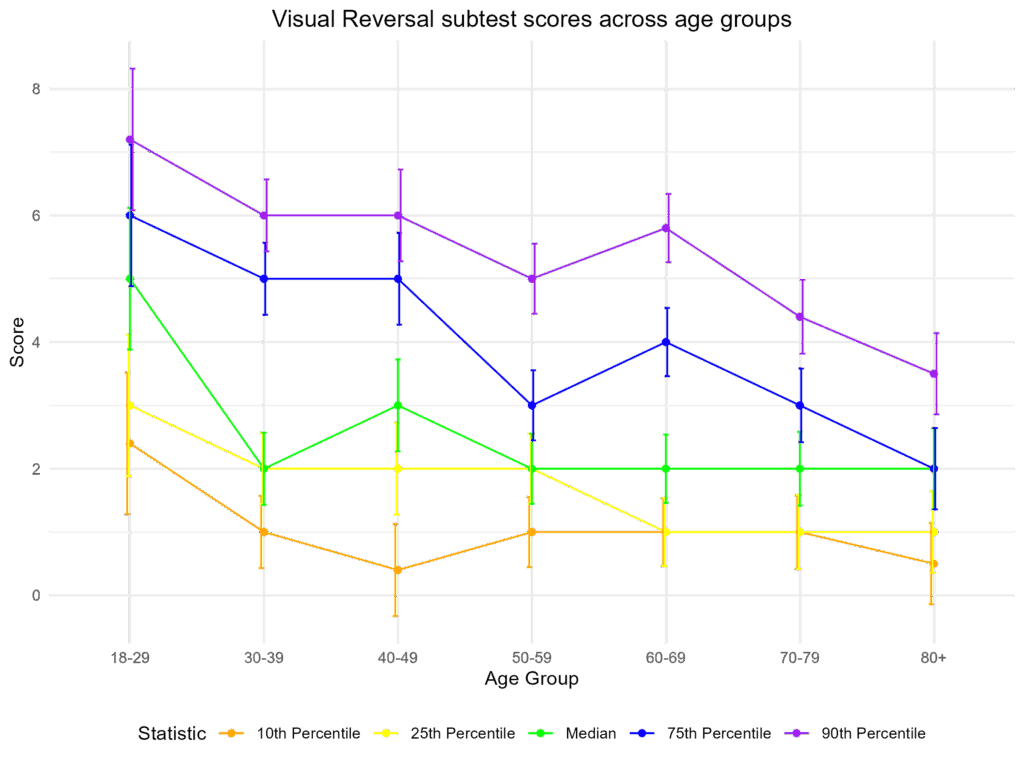Measuring Cognitive Aging with Memory and Processing Speed Tasks
Dr. Russell T. Warne
May 23, 2025The work continues on the Reasoning and Intelligence Online Test (RIOT), and the team is getting closer to launch. As I dive into the data, I am discovering insights that I have started to share. One of the most practical things I have learned is that online tasks can be extremely useful for measuring cognitive aging. This is especially true for the RIOT’s processing speed and working memory tasks.
Psychologists have known for many years that people experience a mental slowing as they age (Tucker-Drob et al., 2019). Memory declines (even when dementia is not present) are also well documented (Schaie, 2013). These insights are not the special knowledge of scientists. Everyday people know what “senior moments” are, and there is a general familiarity with a mental slowdown in old age.
These declines are observable in the RIOT’s working memory and processing speed subtests. The graph below shows the scores at the 10th, 25th, 50th, 75th, and 90th percentiles on the Visual Reversal subtest of the RIOT. In the test’s norm sample, even the best individuals in their 70s and 80s are performing worse than the median young adult.
These declines are observable in the RIOT’s working memory and processing speed subtests. The graph below shows the scores at the 10th, 25th, 50th, 75th, and 90th percentiles on the Visual Reversal subtest of the RIOT. In the test’s norm sample, even the best individuals in their 70s and 80s are performing worse than the median young adult.

The Visual Reversal subtest is memory task has two components: remembering a sequence and then repeating it in reverse order. The reversal part makes the task more difficult than most memory tasks. But a decline is also apparent in the Exposure Memory subtest, which is an even simpler memory task that requires only recognition of images immediately after they were shown.

It is interesting, though, that on the simpler task, the declines are only present in the top 25% of sample members. There is little or no decline in the middle or bottom of the distribution.
The RIOT also shows the decline in processing speed in adulthood. This is most apparent on the Symbol Search subtest, which asks examinees to respond “yes” or “no” as many times as possible to questions like the example below. There is a 2-minute time limit for this subtest.

The task is extremely easy for everyone. The average norm sample member completes 32.2 items in 2 minutes, with an accuracy of 96.4%. The vast majority (80.2%) of sample members did not commit any errors at all. Therefore, there is little variation in correct vs. incorrect scores. Instead, the Symbol Search subtest is almost entirely a measure of speed. This makes it unsurprising that it shows a stark decline in adulthood:

The decrease in performance in older cohorts in Symbol Search is so strong that a person at the 90th percentile in the group aged 80 or above performs worse than over 75% of individuals under 30!
These graphs show how useful the RIOT is as a measure of cognitive aging. The test effectively tracks decreases in working memory and processing speed in old age, and its results track closely with those of prior research.
Readers should be aware that these graphs show results from a cross-sectional sample. That means that the graph compares data collected from people at different ages in 2025. This is not a longitudinal study that follows the aging process in a group of people as they advance from young adulthood to their senior years. The exact magnitude of score declines differ in cross-sectional and longitudinal research, but the pattern of decrease in working memory and processing speed is present in both designs. The fact that the RIOT can show this decrease in a cross-sectional sample means it can probably also track this decline longitudinally in a group of people over time.
My hope is that the RIOT will become a tool that helps researchers, physicians, and clinicians monitor and understand the mental aging process. The RIOT team is willing to partner with anyone who wants to use the RIOT in their work with aging individuals. I hope interested readers will reach out to me. It would be a lot of fun to build a testing schedule, expand the RIOT’s assessment portfolio, and work to understand this important aspect of the aging process.
References
Schaie, K. W. (2013). Developmental influences on adult intelligence (2nd ed.). Oxford University Press.
Tucker-Drob, E. M., Brandmaier, A. M., & Lindenberger, U. (2019). Coupled cognitive changes in adulthood: A meta-analysis. Psychological Bulletin, 145(3), 273-301. https://doi.org/10.1037/bul0000179
We hope you found this information useful. For further questions, please join our Discord server to ask a Riot IQ team member or email us at support@riotiq.com. If you are interested in IQ and Intelligence, we co-moderate a related subreddit forum and have started a Youtube channel. Please feel free to join us.
Community
News & Press
Intelligence Journals & Organizations
Our Articles
Riot IQ © 2025
